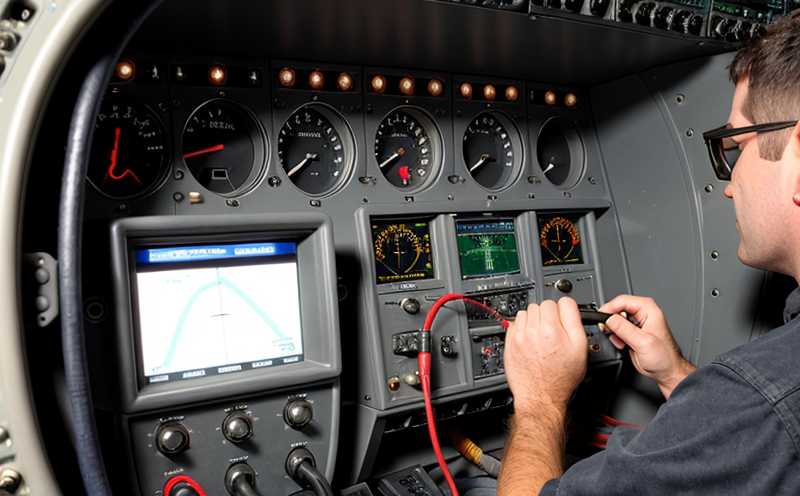IEC 60068-2-14 Thermal Shock Testing of Avionics Components
The IEC 60068-2-14 standard is a crucial protocol for assessing the thermal shock resistance of avionics components. This testing procedure simulates extreme temperature changes that these critical systems might experience during operation, ensuring their reliability and durability in aerospace environments.
Thermal shock tests are conducted by rapidly cycling a specimen through wide temperature ranges using a controlled environment chamber. The specimens undergo repeated heating and cooling cycles to evaluate the potential for mechanical fatigue, material degradation, and operational failure due to thermal stress. This testing is essential for avionics components as they must withstand harsh environmental conditions, including extreme temperatures and rapid changes in atmospheric pressure.
The IEC 60068-2-14 standard provides a detailed methodology for performing these tests, specifying the temperature ranges, cooling rates, and duration of exposure. Compliance with this standard is critical for avionics manufacturers to ensure their products meet safety and performance requirements before entering commercial or military use.
The process involves several key steps. First, the specimens are prepared according to manufacturer specifications, ensuring they represent typical operational conditions. The test chamber then cycles through a predefined temperature profile, typically ranging from -40°C to +125°C, with controlled heating and cooling rates. During each cycle, the specimen is exposed to these extreme temperatures for a specified duration, allowing it to equilibrate within the chamber.
The testing apparatus used in this process includes high-precision temperature control systems capable of achieving rapid transitions between hot and cold conditions. Sensors monitor both internal and external temperatures of the specimens throughout the test cycles, providing real-time data on thermal stress experienced by each component.
Upon completion of the prescribed number of cycles, the specimens are inspected for any signs of damage or failure. Compliance with IEC 60068-2-14 ensures that avionics components can withstand these extreme conditions without compromising their integrity or performance.
The significance of this testing cannot be overstated. In aerospace and aviation applications, where environmental conditions are often severe and unpredictable, the reliability of avionics is paramount. Non-compliance with standards such as IEC 60068-2-14 can lead to operational failures that could have catastrophic consequences.
To summarize, compliance with IEC 60068-2-14 ensures that avionics components are robust and reliable under extreme thermal conditions. This testing is essential for maintaining the safety and performance of aerospace systems, making it a critical step in quality assurance processes.
Customer Impact and Satisfaction
- Ensures compliance with international standards
- Enhances product reliability and longevity
- Reduces the risk of operational failures
- Improves customer trust and satisfaction
- Aids in meeting stringent regulatory requirements
- Promotes a safer operating environment for avionics systems
The successful completion of IEC 60068-2-14 thermal shock testing significantly impacts customers by providing them with products that are not only reliable but also compliant with international safety and performance standards. This enhances trust in the brand, reduces potential liabilities from product failures, and ensures consistent high-quality outputs.
By adhering to this standard, manufacturers can demonstrate their commitment to producing robust avionics components capable of withstanding harsh environmental conditions. This not only meets regulatory requirements but also sets a benchmark for quality and performance excellence in the industry.
Environmental and Sustainability Contributions
The IEC 60068-2-14 thermal shock testing process plays a vital role in promoting environmental sustainability by ensuring that avionics components are designed to withstand extreme conditions without compromising on performance. This reduces the likelihood of premature failure, which could lead to increased waste and resource consumption.
By conducting rigorous testing according to this standard, manufacturers can identify potential weaknesses early in the design phase, allowing for iterative improvements. This approach minimizes material and energy waste during manufacturing processes while ensuring that components are optimized for longevity and durability.
The use of controlled environmental chambers in thermal shock testing also contributes positively to resource efficiency by simulating real-world conditions in a contained environment. This reduces the need for extensive field trials, which can be resource-intensive and time-consuming.
In summary, compliance with IEC 60068-2-14 aligns with broader sustainability goals by promoting the development of robust, reliable avionics components that reduce waste and enhance overall system performance. This contributes to a more sustainable aerospace industry where environmental considerations are integrated into product design and testing processes.
Use Cases and Application Examples
| Use Case | Description |
|---|---|
| Aircraft Avionics | Ensuring that avionics systems can operate reliably under extreme temperature changes. |
| Military Aircraft Systems | Testing components for durability in harsh, variable climate conditions. |
| Spacecraft Avionics | Evaluating the performance of avionics components exposed to rapid and wide temperature variations. |
| Unmanned Aerial Vehicles (UAVs) | Verifying that UAV systems can perform consistently in unpredictable environmental conditions. |
The application examples of IEC 60068-2-14 thermal shock testing are numerous and varied, spanning various aerospace sectors. For instance, aircraft avionics require continuous operation under a wide range of temperatures to ensure safe and efficient flight. Military aircraft systems must be tested for durability in extreme environments, including combat zones where temperature fluctuations can be significant.
In the spacecraft industry, avionics components are subjected to rapid and wide temperature variations during launch and orbit, making thermal shock testing essential for ensuring their reliability. Similarly, unmanned aerial vehicles (UAVs) face unpredictable environmental conditions, necessitating thorough testing to ensure consistent performance.





